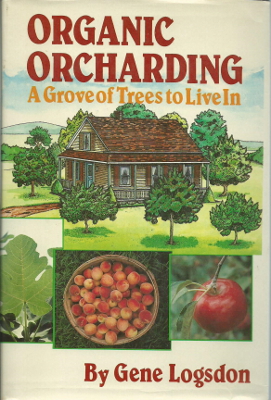
Organic Orcharding
 "The decision to start an orchard
involves a decision to stay put. The first plant you want to get rooted
in the earth is yourself. That's what makes home orchards so valuable;
where they abound, they speak eloquently of a stable and responsible
community, the first necessity of a healthy civilization and a happy
culture."
"The decision to start an orchard
involves a decision to stay put. The first plant you want to get rooted
in the earth is yourself. That's what makes home orchards so valuable;
where they abound, they speak eloquently of a stable and responsible
community, the first necessity of a healthy civilization and a happy
culture."
I've owned a copy of Gene Logsdon's Organic Orcharding
since I was in high school, but I don't think I ever read it until this
year. I do recall flipping through the book and dreaming about my
very own fruit trees, but am pretty sure I skipped the all-important
chapters on pest control and didn't read the other how-to chapters with a
very critical eye. So I figured it was time for a more thorough
re-read.
At the time, I also
didn't realize that Gene Logsdon was one of the great homesteading
authors who writes from personal experience, but with a dash of
experimental optimism. In fact, having read at least half a dozen
of his books so far, I'd say that Organic Orcharding is possibly his best --- too bad it's out of print!
Luckily for you, I plan to sum up the highlights in this week's lunchtime series. Stay tuned!
| This post is part of our Organic Orcharding lunchtime series.
Read all of the entries: |
Want more in-depth information? Browse through our books.
Or explore more posts by date or by subject.
About us: Anna Hess and Mark Hamilton spent over a decade living self-sufficiently in the mountains of Virginia before moving north to start over from scratch in the foothills of Ohio. They've experimented with permaculture, no-till gardening, trailersteading, home-based microbusinesses and much more, writing about their adventures in both blogs and books.
Want to be notified when new comments are posted on this page? Click on the RSS button after you add a comment to subscribe to the comment feed, or simply check the box beside "email replies to me" while writing your comment.

I agree, Organic Orcharding is an excellent book. Although out of print, it is very much available, and affordable.
Amazon has 42 copies available, and Abebooks.com has 12 copies available, starting at $7.74 delivered.
Walden Effect readers may be interested in Abebooks.com - an online clearinghouse for used booksellers, including many non-profit and charitable organizations.
Some of those booksellers are the literary equivalent of "no-kill" animal shelters.
They use their sales revenue to send books to institutions world-wide (not everyone has internet yet) as an alternative to recycling unwanted books for their fiber content or burning them for their thermal content.
I am a great fan of Amazon, for more reasons than I can list here.
Amazon has revolutionized publishing and retailing, benefiting both consumers and producers.
Living more than 20 miles from town, Amazon Prime saves us time, money, and motor fuel.
However, Abebooks.com has also earned a place at the table, and I don't feel out of place recommending them as an alternative source for used books.
Thanks again, Anna and Mark, for all that you share with us.
Stay warm and dry!
I'm heading out to do chores.
Harry has a great point about finding out-of-print books from alternative sources. I wanted to give a shout-out to one of my favorite alternative sources, too!
Better World Books is a used book seller like a number of other sites, but has a core mission of promoting literacy around the world. They've donated millions of books to developing countries and set aside a significant portion of their proceeds to do so. I found them in college when they happened to be the cheapest source of one of the textbooks I needed.
They also have a number of copies of Organic Orcharding, but they go up in price pretty quickly after the cheapest few. They also have a link to Anna's review from goodreads.com.
I haven't read this book yet, so I'm excited to see what's in store for this weeks lunchtime series!